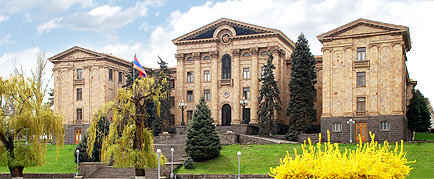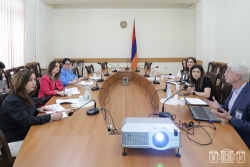While implementing any program the right need assessment, as well as the close cooperation with the executive power and the legislative body is important. The problems, which in practice will be raised, it is also possible to bring forth need of legislative regulation, which means that the legislative body should also be aware of the program procedure and the emerged problems, in order to be able either with legislative amendments or through the Government policies to improve the existing situation: the Chair of the Standing Committee on Labor and Social Affairs Heriknaz Tigranyan said during the meeting with the members of the organization Democracy International.
On May 29, the meeting, where the member of the Committee Zaruhi Batoyan also took part, was held.
The Country Director of Democracy International Armenia James Wasserstrom presented the USAID-Funded Protection, Inclusion and Empowerment Activity Program, the goal of which is to improve the life of the vulnerable and marginalized groups, through the cooperation activation between the field amendments of the legislative amendments, the improved services and the state and non-state players. “The aim of the program is to help the targeted vulnerable groups in Armenia. We want to reveal the needs of the marginalized and vulnerable groups in order to be able supporting the Government – to have qualified social services. It is also important that all the services, which should receive the vulnerable and marginalized groups be at the right time and place,” James Wasserstrom said.
The program launched for 5-year period, which has 5 components, is also aimed at the people’s social protection in the crisis situations.
Presenting in detail the program components, the Country Director of Democracy International Armenia touched upon the policies and legislative reforms directed to the inclusion, protection and empowerment, which are considered to be the first component of the program. The second component designs to introduce improved services for vulnerable and marginalized groups aimed at inclusion, protection and empowerment. According to the speaker, the third component designs expanded protection and inclusion for the disability and victims of violent military operations.
The fourth component of the program refers to the awareness, communication and the researches on the policies and services of the social sphere. The fifth component is the adaptive social protection aimed at the global or inner crises impacts.
The main sectoral partner of the program is the RA Ministry of Labor and Social Affairs. Within the framework of the program support will be shown to the RA Ministry of Labor and Social Affairs to introduce assessment and monitoring system, as well as to implement public awareness and communication. It is also envisaged to support the educational agenda, a multi-sectoral working group will be formed to assist the process of reforms in the social protection system, as well as to raise the voices of the vulnerable groups.
During the first year of the program assessment of available needs in the protection sphere will be carried out, which will go along with the analysis on the theme gender equality and social inclusion. The abovementioned researches will launch from June of this year, and its aim is to understand what social services are rendered to the targeted and vulnerable groups at the given moment, to disclose the gaps and to fill in them. In September, the results of the research, which will be predetermined for defining the program further priorities, will be ready.
Zaruhi Batoyan highlighted the participation of the targeted groups in the program implementation process. Speaking about the persons who suffered from the conflicts, she evaluated the quick response programs.
According to Heriknaz Tigranyan, many NGOs carry out numerous grant funding projects, but sometimes they don’t fix distinct results. Hence, she once again emphasized the importance of registration of distinct, tangible and visible results.




 29.05.2023
29.05.2023 29.05.2023
29.05.2023 29.05.2023
29.05.2023 29.05.2023
29.05.2023
